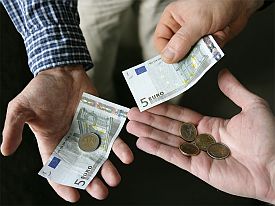Analytics, Estonia, Financial Services, Legislation, Markets and Companies, Wages
International Internet Magazine. Baltic States news & analytics
Wednesday, 29.10.2025, 23:48
Estonian employers want to raise minimum wage to 448 euros in 2 years, trade unions – by a quarter more
 Print version
Print version |
|---|
The confederation proposed that next year, the minimum wage would increase to 417 euros and 448 euros in 2017. Currently, the minimum wage is 390 euros a month.
Employers' Confederation President Toomas Tamsar said that the minimum wage should be raised, because it is too close to the poverty line. The minimum wage increase proposed by the employers is faster than the average wage growth in Estonia, bringing the minimum wage closer to the average wage.
According to the Confederation, employers support concluding a long-term agreement on minimum wages, so that both employers and employees can have confidence.
"When raising the minimum wage, it should be observed that workers, who earn the minimum wage or close to it would not suffer. Too sharp a rise could lead to companies needing the low-skilled labour reducing their activities or moving away from Estonia, which would deprive people of jobs instead and would leave them on state support," said Tamsar.
Trade Unions however announced that their proposal to the employers today was to raise the national minimum wage to 488 euros a month in 2016 an to 609 euros in 2017.
"Based on Tax Board and the branch trade unions' wages information, we can say that this is the level where no massive layoffs should be feared," said the chairman of the Trade Union Confederation Peep Peterson.
Trade Unions estimate that wage poverty is a heavy burden on the economy and there is a reasonable expectation in the society for faster increase in the minimum wage. According to Peterson, 25% increase would revitalise the economy and would back to the labour market people who have no motivation to look for a job here.
Commenting on today's employers' offer, Peep Peterson said that 418 euros by 2016 is below the expectations of any kind, and it would be a very bad signal to both the low-paid people in Estonia as well as the economy in general.
Negotiations continue on June 8.
In Estonia, minimum wages are agreed upon by the Estonian Employers' Confederation of Estonian Trade Union Confederation.
The minimum wage was earned in the first quarter of this year by nearly 25,000 people working full-time.








 «The Baltic Course» Is Sold and Stays in Business!
«The Baltic Course» Is Sold and Stays in Business!

